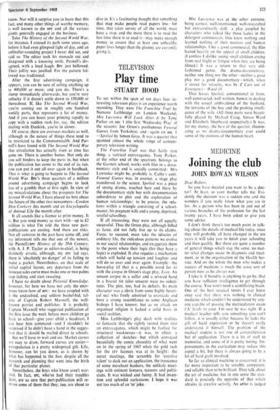Play time
TELEVISION STUART HOOD
To see within the span of ten days four in- teresting television plays is an experience worth recording. They were The Franchise Trail by Nemone Lethbridge on London Weekend; Mrs Lawrence Will Look After It by Tony Parker on BBC I (the first 'Wednesday Play' of the season); Joe Orton's posthumous Funeral Games from Yorkshire; and—again on BBC I —Spoiled by Simon Gray. It was a quartet that spanned almost the whole range of contem- porary television writing.
The Franchise Trail was that fairly rare thing, a satirical extravaganza. Tony Parker, at the other end of the spectrum, belongs to the Garnett school, works with film in a docu- mentary style and is socially committed : Mrs Lawrence might be, probably is, Cathy's aunt. Funeral Games was, in essence, a stage play transferred to the screen. Spoiled was a piece of strong drama, touched here and there by the documentary style but with documentation subordinate to plot and the exploration of human relationships: to be precise, the rela- tions within a triangle consisting of a school- master, his pregnant wife and a young, deprived, wistful schoolboy.
If all interesting, they were not all equally successful. Thus the Orton play, although billed as farce, did not fully live up to its claims. Farce, to succeed, must take the idiocies of ordinary life, the ridiculous patterns we evolve in our social relationships, and exaggerate them to the point where their logic (for they have a logic) is exploded. It also requires a mechanism which will build up tension and laughter and will do so over and over again. Example—the horse-play (if that is a possible word for it) with the corpse in Orton's stage play, Loot. An unseen corpse in a cellar and a severed hand in a biscuit tin (also unseen) were no substif tutes. The plot, too, had its defects. Its main character was a cleric from some highly hereti- cal sect who freely admitted to uxoricide and bore a strong resemblance to some Anglican bishops I have known; but as an attack on organised religion it lacked a solid basis in social realities.
Miss Lethbridge's play dealt with realities so fantastic that she rightly turned them into an extravaganza, which might be faulted for structural weaknesses—it was, in effect, a collection of sketches—but which conveyed beautifully the comic absurdity of what went on in the spring of 1967 when the gold rush for the Iry licences was at its height: the secret meetings, the scramble for 'creative talent' to deck out an application, the innocence of some merchant bankers, the unlikely meet- ings with eminent lawyers, tycoons and politi- cians. It was wicked and funny. It had inven- tion and splendid caricatures. I hope it was not too much of an 'in' joke. - - Mrs Lawrence was at the other extreme, being earnest, well-intentioned, well-researched but extraordinarily dull: a play peopled by characters who talked like those ladies in the detergent commercials. One knew nothing and learned nothing of their motives and human relationships. Like a good commercial, the film leaned heavily on the appeal of small children. (I confess I dislike seeing small children crying from real fright or fatigue when they are being filmed.) It was a return to that very old- fashioned genre, the drama-documentary. neither one thing nor the other—neither a good play nor a good documentary—which, when it strove for veracity, was by Z Cars out of Emergency—Ward 10.
That leaves Spoiled, conventional in form. well constructed, well written, honest in dealing with the sexual ambivalence of the husband, the tensions of the boy and the probing intelli- gence of the wife. (All three parts were beauti- fully played by Michael Craig, Simon Ward and Elizabeth Shepheard respectively.) It was, for my money, the best of the quartet, illumin- ating as no drama-documentary ever could some of the motions of the human heart.






































 Previous page
Previous page